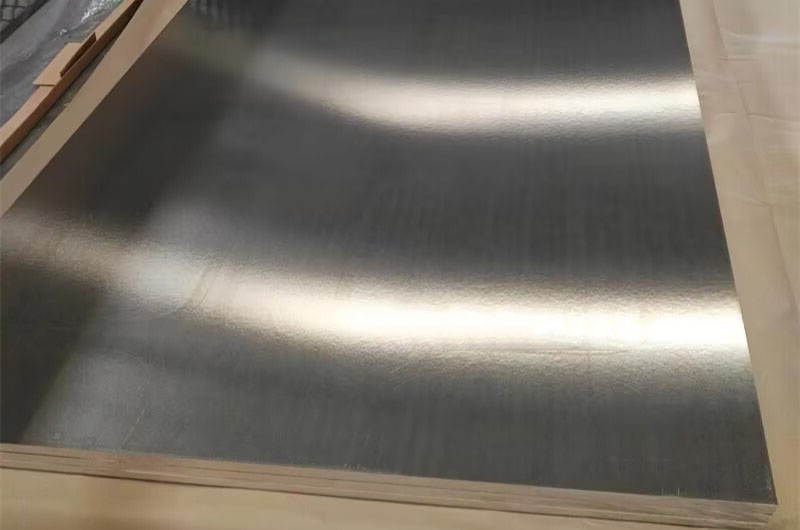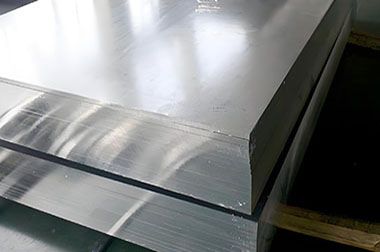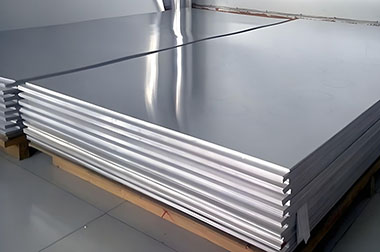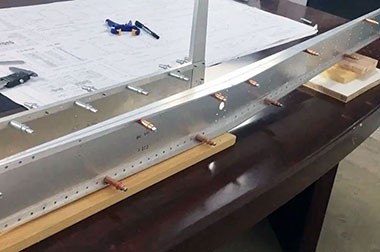7475 t761 Aluminum Sheet
7475 aluminum alloy is a high-strength heat-treatable alloy, known for its excellent strength and toughness, making it suitable for demanding applications.
7475 aluminum is a high-strength alloy in the 7000 series, primarily alloyed with zinc (5.2-6.2%), magnesium (2.1-2.9%), and copper (1.2-1.9%), with trace amounts of chromium (0.18-0.25%), to enhance stress corrosion cracking (SCC) resistance. Compared to similar alloys like 7075, it is known for its high purity and excellent fracture toughness.
7475 T761 aluminum sheet is widely used in the aerospace industry, particularly in applications requiring high strength, excellent corrosion resistance, and some toughness.
Both 7475 T761 and 7475 T76 aluminum sheets belong to the same series of materials. 7475 T761 aluminum sheet is widely used in the aerospace industry, mainly because it has higher toughness than the 7475 T76 version. This increase in toughness gives 7475 T761 better corrosion resistance, particularly in resisting exfoliation corrosion.

7475 T761 Aluminum Heat Treatment
The T761 temper designation indicates that the alloy has undergone solution heat treatment, followed by aging at a lower temperature to achieve a balance between strength and toughness.
- T7: Indicates that the alloy has undergone solution heat treatment followed by aging. This process stabilizes the microstructure, sacrificing some strength (compared to T6) to improve SCC resistance.
- 61: Specifies a two-step aging process. The first digit (6) indicates a specific controlled aging sequence to optimize mechanical properties, while the second digit (1) may refer to slight variations in processing parameters to ensure consistent performance in critical applications.
7475 T761 Aluminum Sheet Standards
- AMS 4100: Aerospace and aerospace industry standard material.
- EN 2803, 3.4377: European standard.
- AMS 4085, AIR 9048-290: Bare sheet standards.
Manufactured through hot/cold rolling to typical sheet thicknesses (0.5-6.35 mm).
Conforms to standards such as AMS 4200 (Aerospace Material Specifications) and ASTM B209.
Surface treatments range from rolled surfaces to aluminizing or anodized coatings for corrosion protection.
7475 T761 Aluminum Sheet Properties
Fatigue Performance
7475 T761 offers excellent resistance to fatigue crack propagation, which is crucial for aircraft components.
Strength
- Medium strength: Compared to other high-strength aluminum alloys, 7475 T761 provides moderate strength, typically used in aerospace applications that require high strength and low weight. Its tensile strength and yield strength perform well in the T761 heat-treated state.
- Strength levels are optimized during the heat treatment process, and the T761 heat-treated state improves the material’s toughness and fatigue resistance while maintaining strength.
Machinability and Formability
- Machinability: 7475 T761 aluminum alloy has normal machinability, suitable for milling, drilling, cutting, and other common machining operations.
- Formability: The formability is average. Although the material has high strength, it still retains good operability during cold working processes.
Corrosion Resistance
Excellent corrosion resistance: Compared to other aluminum alloys, 7475 T761 shows excellent corrosion resistance. It is particularly resistant to stress corrosion cracking (SCC), making it ideal for aerospace components that require high corrosion resistance.
Due to its unique composition, 7475 T761 has good adaptability to most corrosive environments, such as marine environments and areas with significant climatic changes.
Heat Treatment
Heat-treated state: 7475 T761 aluminum alloy undergoes a heat treatment process, particularly in the T761 condition, which effectively improves the mechanical properties and corrosion resistance of the aluminum sheet. The T761 state, compared to the T76 state, has higher toughness and better exfoliation corrosion resistance.
The heat treatment effect makes this material widely used in aerospace, especially in aircraft structural components, where it can withstand large loads and long-term fatigue stress.
Weldability
Poor weldability: 7475 T761 has poor weldability, especially with conventional welding methods such as TIG (Tungsten Inert Gas welding) or MIG (Metal Inert Gas welding). Welding may affect its strength and corrosion resistance, so mechanical fastening methods like riveting or bolting are usually used instead.
7475 T761 Aluminum Sheet Applications
- Aerospace industry: Due to its excellent overall performance, 7475 T761 aluminum sheet is primarily used for manufacturing aircraft structural components, especially parts that require high strength and the ability to withstand fatigue loads, such as wings, tailfins, and fuselage frames.
- High-strength structural components: 7475 T761 is used for manufacturing certain high-strength structural parts of aerospace vehicles, such as landing gear brackets, fuselage skins, and other components that require high strength and corrosion resistance.
7475 T761 aluminum sheet also has other applications, such as playing a critical role in the manufacture of fighter jets and spacecraft. Additionally, it is widely used in industries such as textile manufacturing for high-speed rotating parts, as well as shipbuilding, large chassis, and central equipment manufacturing.
7475 T761 Aluminum Sheet Advantages
- High toughness and corrosion resistance: Compared to other high-strength aluminum alloys like 7075, 7475 T761 has a clear advantage in resisting exfoliation corrosion and stress corrosion cracking.
- Good machinability and formability: Although the material has high strength, it still adapts well to various conventional machining methods.
- Wide application: It is primarily used in aerospace structural components that require high strength, excellent corrosion resistance, and toughness.
7475 T761 aluminum sheet, with its excellent strength, toughness, and corrosion resistance, has become one of the most commonly used aluminum alloys in the aerospace industry. Its heat treatment process allows it to maintain strength while enhancing toughness, making it particularly suitable for the manufacturing of aircraft structures and high-strength components. However, due to its poor welding performance, mechanical fastening methods are typically used.
7475 T761 Aluminum Sheet Supplied Forms
7475 T761 Aluminum Sheet is available in two forms (Alclad and bare 7475 T761 aluminum sheet) for aerospace applications. However, the Alclad version, with its protective coating, offers excellent corrosion resistance, making it an ideal choice for components exposed to the environment. The bare version, on the other hand, emphasizes maximum strength for structural components, which have different corrosion protection treatments.
7475 T761 Alclad Aluminum Sheet
7475 T761 Alclad aluminum sheet is a high-strength, heat-treated alloy primarily used in the aerospace industry for demanding structural applications. The Alclad coating refers to a thin layer of 1XXX series aluminum (usually 1050 or 1100) that is bonded to the surface of the 7475 alloy. This coating provides excellent corrosion resistance, making the material ideal for use in environments where durability and resistance to atmospheric conditions are critical, such as aircraft skins, fuselage structures, and wing components. The Alclad layer acts as a protective barrier, preventing oxidation of the underlying high-strength core alloy while maintaining the material's overall strength and integrity.
Bare 7475 T761 Aluminum Sheet
Bare 7475 T761 aluminum sheet is a high-strength, heat-treated material that is supplied without any additional protective cladding. This version of the sheet is typically used in applications where the primary concern is strength and where corrosion resistance is less critical or can be managed through other means, such as coatings or anodizing. The T761 temper is achieved through a combination of heat treatment and controlled cooling, which enhances the material's strength, making it ideal for use in high-performance aerospace and military applications.
| Properties | 7475 T761 Alclad Aluminum Sheet | Bare 7475 T761 Aluminum Sheet |
| Image |

|

|
| Coating | Coated with 1XXX series aluminum (such as 1050 or 1100) Alclad layer | No coating, bare aluminum surface |
| Corrosion Resistance | Excellent, Alclad layer provides outstanding corrosion protection | Poor, requires additional methods (such as coatings or anodizing) to enhance corrosion resistance |
| Strength | High strength, suitable for high-strength structural applications | Extremely high strength, suitable for structural load-bearing requirements |
| Application Fields | Aerospace structural components (such as fuselage, wing skins, etc.) | Aerospace structural components (such as fuselage frames, wing beams, etc.) |
| Weight | Lightweight, maintains high strength-to-weight ratio | Lightweight, high strength |
| Formability | Good formability, suitable for processing complex structures | Good machinability, suitable for parts that bear high loads |
| Heat Treatment | T761 condition, heat-treated to enhance strength | T761 condition, heat-treated to enhance strength |
| Surface Treatment | Aluminum outer layer provides additional protective coating to prevent oxidation | No outer protective coating, requires additional treatment to prevent oxidation |
| Applicable Industries | Aerospace, military, especially for structural components exposed to the environment | Aerospace, military, for high-strength structural components |
7475 t761 Aluminum Material Data Sheet
| Physical Properties | Metric | English | Comments |
| Density | 2.81 g/cc | 0.102 lb/in³ | AA; Typical |
| 7475 t761 Aluminum Mechanical Properties | |||
| Hardness, Brinell | 140 | 140 | 500 kg load with 10 mm ball. Calculated value. |
| Hardness, Knoop | 177 | 177 | Converted from Brinell Hardness Value |
| Hardness, Rockwell A | 51.6 | 51.6 | Converted from Brinell Hardness Value |
| Hardness, Rockwell B | 84 | 84 | Converted from Brinell Hardness Value |
| Hardness, Vickers | 162 | 162 | Converted from Brinell Hardness Value |
| Ultimate Tensile Strength | 517 MPa | 75000 psi | AA; Typical |
| Tensile Yield Strength | 448 MPa | 65000 psi | AA; Typical |
| Elongation at Break | 12 % | 12 % | AA; Typical; 1/16 in. (1.6 mm) Thickness |
| Modulus of Elasticity | 70.3 GPa | 10200 ksi | AA; Typical; Average of tension and compression. Compression modulus is about 2% greater than tensile modulus. |
| Poisson's Ratio | 0.33 | 0.33 | |
| Shear Modulus | 27 GPa | 3920 ksi | |
| Shear Strength | 310 MPa | 45000 psi | Calculated value. |
| 7475 t761 Aluminum Electrical Properties | |||
| Electrical Resistivity | 4.32e-006 ohm-cm | 4.32e-006 ohm-cm | AA; Typical at 68°F |
| 7475 t761 Aluminum Thermal Properties | |||
| CTE, linear 68°F | 23.2 µm/m-°C | 12.9 µin/in-°F | AA; Typical; Average over 68-212°F range. |
| CTE, linear 250°C | 25.2 µm/m-°C | 14 µin/in-°F | Average over the range 20-300ºC |
| Specific Heat Capacity | 0.88 J/g-°C | 0.21 BTU/lb-°F | Estimated from trends in similar Al alloys. |
| Thermal Conductivity | 147 W/m-K | 1020 BTU-in/hr-ft²-°F | AA; Typical at 77°F |
| Melting Point | 477 - 635 °C | 890 - 1175 °F | AA; Typical range based on typical composition for wrought products 1/4 inch thickness or greater |
| Solidus | 477 °C | 890 °F | AA; Typical |
| Liquidus | 635 °C | 1175 °F | AA; Typical |
| 7475 t761 Aluminum Processing Properties | |||
| Annealing Temperature | 413 °C | 775 °F | |
| Solution Temperature | 516 °C | 960 °F | must be preceded by soak at 870 to 890°F |
| Aging Temperature | 121 - 177 °C | 250 - 350 °F | |
7475 T761 Aluminum Sheet Compared with Other Tempers
- T761 vs T6: Lower strength but better SCC resistance.
- T761 vs T7351: Similar corrosion resistance, but T761 may offer custom performance for specific aerospace applications.
| Comparison | 7475 T761 Aluminum Sheet vs T6 | 7475 T761 Aluminum Sheet vs T7351 |
| Strength | 7475 T761 aluminum sheet has lower strength compared to T6. The T6 temper undergoes a higher-temperature heat treatment, achieving greater strength, suitable for applications subjected to heavier loads. | The strength difference between 7475 T761 aluminum sheet and T7351 is minimal. T7351 also has high strength, making it suitable for aerospace applications requiring high strength. |
| Stress Corrosion Cracking (SCC) | 7475 T761 aluminum sheet performs better in terms of SCC resistance compared to T6. The heat treatment process for T761 reduces internal stresses, helping to prevent crack formation, especially in high-stress environments. | 7475 T761 aluminum sheet and T7351 have similar SCC resistance, both exhibiting strong performance against stress corrosion cracking, suitable for use in harsh environments. |
| Corrosion Resistance | 7475 T761 aluminum sheet offers slightly improved corrosion resistance compared to T6, especially under more demanding environmental conditions, providing a longer service life. | 7475 T761 aluminum sheet and T7351 aluminum alloy have similar corrosion resistance, both showing excellent performance, particularly suitable for marine or humid environments. |
| Custom Performance | 7475 T761 aluminum sheet provides custom performance for aerospace applications, particularly in combating crack propagation and stress corrosion, with specific treatments available based on application needs. | 7475 T761 aluminum sheet offers finer performance tuning compared to T7351 in certain aerospace applications, especially in crack resistance and high-stress endurance. |
7475-T761 aluminum sheet is a high-quality aerospace-grade material optimized for applications requiring high fracture toughness, fatigue resistance, and stress corrosion cracking resistance. Its balanced properties make it the material of choice for critical structural components in demanding environments.
Notes
- Weldability: 7475 aluminum alloy is not suitable for welding due to its composition and the possibility of reduced strength in the welded area.
- Machinability: The alloy has good machinability, allowing for precise manufacturing of complex parts.
- Store in dry environments to prevent corrosion.
- Avoid excessive cold working without annealing to prevent cracking.




